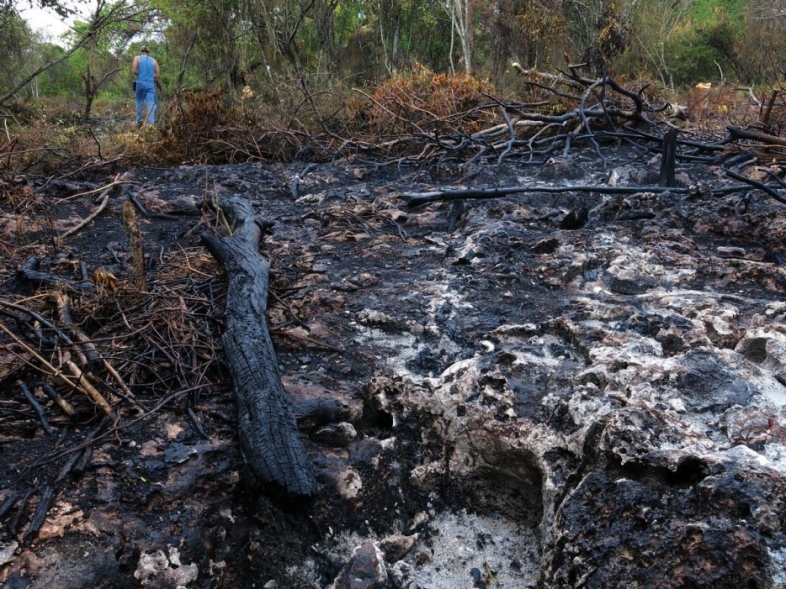By Grupo Jaragua. VCE collaborates closely with our long-time partner Grupo Jaragua on science-based conservation issues in the Jaragua-Bahoruco-

Earlier this year, we encountered clearing of natural forest for agriculture within the limits of Jaragua National Park. / © Miguel A. Landestoy
For years we have been deeply worried about accelerated deforestation of Jaragua and Sierra de Bahoruco National Parks, core zones of the UNESCO Biosphere Reserve Jaragua-Bahoruco-Enriquillo in the Dominican Republic. The aggressive expansion of agriculture in the park is simply incompatible with the preservation of these unique forests and their associated biodiversity. Now, new developments near the settlement of Las Mercedes are especially worrying and in need of attention.
What is the situation?
We found that an area within the boundaries of Jaragua National was wrongfully designated for agricultural purposes: 25 hectares of natural forests were cleared to grow corn and pumpkins near the village of Las Mercedes (Pedernales Province). Most of this deforestation took place within the boundaries of Jaragua National Park, in the corridor area linking it with Bahoruco National Park. Both of these protected areas are part of Jaragua-Bahoruco-Enriquillo UNESCO’s Biosphere Reserve, and have been designated as Important Bird and Biodiversity Areas (IBAs), Key Biodiversity Sites and Alliance for Zero Extinction Site because they provide habitat for many endemic and endangered species.
Deforestation in these areas implies losing key habitat for many endangered species—leading to related problems such as the loss of water retention for the Pedernales river watershed. Moreover, this destruction serves absolutely no long-term purpose, as destruction of these forests to establish crops is unsustainable and will not solve local poverty problems. Most of the thin fertile soil layer will be washed away after a couple of harvests in these limestone hills (with often steep slopes), and the remaining area will be useless as habitat and as agricultural land.
Unfortunately, forest destruction in the protected areas near Pedernales is a recurrent problem. In fact, BirdLife International has already recognised the entire area as a IBA in Danger, recognising threats from agriculture, human disturbance and gathering of terrestrial plants.
We have reported incidents similar to this one at Las Mercedes for over a year now. In total, we already saw the loss of 35km2 of humid forest (or 30% of the total extent of humid forest). Due to bad governance of local environmental authorities, two types of agriculture production systems are increasingly being established at the expense of protected area lands. One is a sharecropping system, consisting of land leases to landless farmers (usually Haitians) for production of short cycle crops (beans, corn, pumpkins, etc.); the other involves the establishment of large avocado farms that target the export market.
As a result of our earlier reports, in April 2013, the Ministry of the Environment sent a technical commission to assess the situation. Despite this commissions’ condemning report, confirming our worries, nothing changed and forest destruction kept increasing—as did our frustration.
In this recent case, we can firmly prove the complicity of local environmental authorities in the destruction of these forests. For example, we took hold of the permit for clearing, which was signed by the authorities involved and we established that the Provincial Environment Director did not know (or pretended not to know) the boundaries of protected areas in his care.
After a visit by two journalists (Diario Libre), the Ministry temporarily suspended the Provincial Director (Leovigildo Méndez) and an associated technician (Rodolfo Méndez) until an investigation was conducted. However, we fear that the political connections of the Provincial Director, also ex-governor of the Province, could soon revert this situation.
What are we doing?
This particular area has already been destroyed. But, concerned citizens and scientists are now contacting the press in an effort to avoid future destruction of protected areas.
We hope that we can avoid the future destruction of forests in protected areas, but for this we need considerable international attention and pressure. We welcome any support, and invite you to contact Grupo Jaragua directly if you think you can help with any aspect of this challenge.
Finally, we are currently contacting high-level officials in the Dominican Republic, asking them the following: “As Dominicans worried about the loss of this irreplaceable natural heritage, we kindly request your aid in putting a halt to the destruction of forests within park limits. To this end, we propose the immediate creation of a commission tasked with solving the root causes of the illegal agriculture expansion in the humid forests of Jaragua and Bahoruco—similar in terms to the Special Commission created for Los Haitises National Park in 2013 (Presidential Order 360-13). This Commission should be enabled to take binding decisions and will need to include representation of civil society groups and individuals concerned with this issue. “
Our fingers are crossed!
